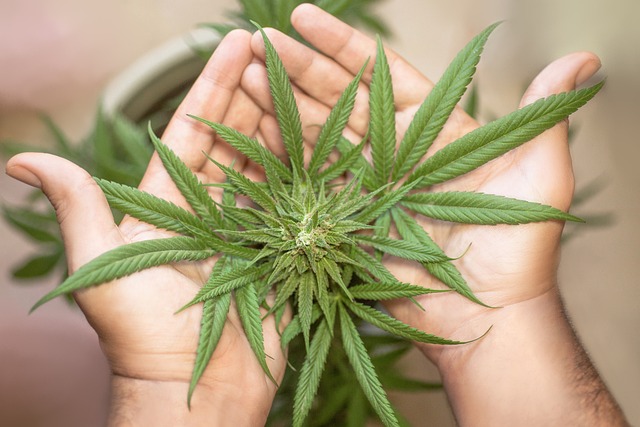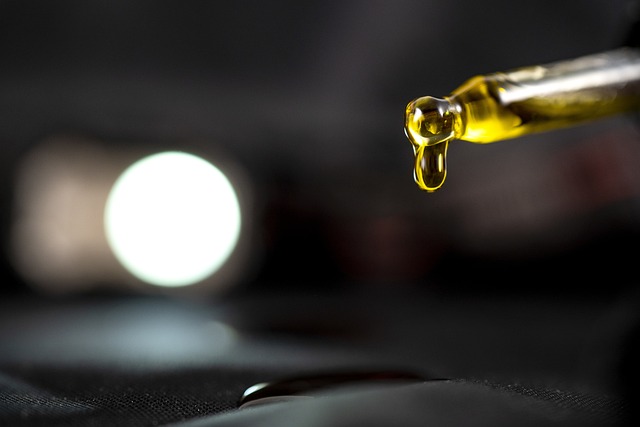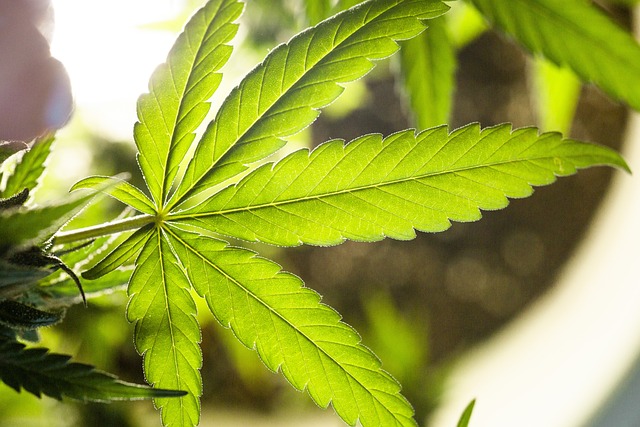THCA infused edibles derived from cannabis plants offer a non-psychoactive, natural approach to pain management, leveraging the anti-inflammatory and analgesic properties of tetrahydrocannabinolic acid (THCA). These edibles interact with the endocannabinoid system to alleviate pain without inducing mind-altering effects. THCA's efficacy for pain relief, particularly for conditions like arthritis and chronic pain, is being increasingly recognized. To maximize their benefits, it's crucial to select high-quality THCA flowers from reputable organic suppliers, understand the strain's specific cannabinoid and terpene profile, and ensure accurate THCA concentrations through lab testing. The process of decarboxylation is essential to activate THCA into THC for it to effectively engage with the body's receptors. Homemade THCA edibles can be a creative and effective way to manage pain, but dosing must be precise, and users should adhere to local laws. It's important for patients to tailor their dosage based on individual needs and consult with healthcare professionals for safe and effective use. The slow onset of relief from THCA-infused edibles requires consistency in dosing for sustained benefits. As research progresses, the potential of THCA as a therapeutic alternative to traditional pain relievers is becoming more evident.
Explore the therapeutic potential of THCA, a natural compound found in the cannabis plant that offers potent pain-relieving benefits. This comprehensive guide delves into sourcing high-quality THCA flower tailored for crafting homemade edibles, ensuring you unlock its full efficacy through proper decarboxylation. Navigate through dosage considerations, scientific insights into its analgesic properties, and a variety of creative recipes for THCA infused edibles, all while maintaining safety awareness. Understand the role of terpenes in amplifying its effects, learn how to store your THCA flower effectively, and discern how it stands against other cannabinoids in pain management. As we traverse the legal landscape of THCA-infused products, this article becomes an indispensable resource for anyone seeking relief through natural means.
- Understanding THCA: The Natural Pain Reliever
- Sourcing High-Quality THCA Flower for Edibles
- Decarboxylation: Activating THCA for Effective Pain Relief
- Crafting Homemade THCA Infused Edibles
- Dosage and Pain Management with THCA Edibles
- The Science Behind THCA's Analgesic Properties
Understanding THCA: The Natural Pain Reliever

delta-9-tetrahydrocannabinolic acid, commonly known as THCA, is a natural compound found in cannabis plants that has garnered attention for its potential therapeutic properties. Unlike its more famous counterpart, THC, THCA is non-psychoactive, meaning it doesn’t induce the “high” typically associated with cannabis. This allows users to experience the analgesic benefits without the mind-altering effects, making it a preferred option for those seeking pain relief during the day or in settings where drug testing is a concern. Emerging research suggests that THCA infused edibles are particularly effective for pain management due to their long-lasting effects and ease of dosage. These edibles can be tailored to individual needs, offering precise control over the amount of THCA consumed, which is crucial for managing chronic pain conditions without overwhelming the body or causing unwanted side effects.
The unique interaction of THCA with the body’s endocannabinoid system has been observed to influence pain perception by modulating neurotransmitter release and immune system responses. This can lead to a reduction in inflammation and alleviation of various types of pain, including neuropathic and muscle soreness. The anti-inflammatory qualities of THCA are also being studied for their potential to address conditions like arthritis. As interest in cannabinoid therapy grows, THCA infused edibles for pain relief represent a promising frontier in natural medicine, offering a complementary approach to traditional analgesics and pain management strategies. With careful dosing and formulation, these products have the potential to significantly improve the quality of life for those suffering from chronic pain.
Sourcing High-Quality THCA Flower for Edibles

When incorporating THCA-infused edibles into your wellness routine, particularly for pain relief, the quality of the THCA flower you select plays a pivotal role in the efficacy and experience of the product. High-quality THCA flowers are rich in cannabinoids and terpenes, which are essential for potent pain relief and can offer a multitude of therapeutic benefits. Sourcing these top-tier flowers begins with understanding the cultivation practices and reputation of the dispensary or provider. Opt for reputable suppliers who prioritize organic farming methods to ensure that the THCA flower is free from harmful pesticides and chemicals, which can compromise both the product’s quality and your health. Additionally, consider the strain’s lineage and its specific cannabinoid and terpene profile; some strains are more potent for pain relief than others. Always verify the provider’s lab testing results to confirm the accurate concentration of THCA and other cannabinoids, as this will influence the intensity and duration of the pain-relieving effects you experience. By adhering to these sourcing guidelines, you can ensure that your THCA infused edibles for pain relief are both effective and safe.
Decarboxylation: Activating THCA for Effective Pain Relief

Delta-9 tetrahydrocannabinol (THC) is well-known for its analgesic properties, providing relief for a wide array of pain conditions. However, raw cannabis flowers contain another cannabinoid, tetrahydrocannabinolic acid A (THCA), which, unlike its decarboxylated counterpart THC, does not produce psychoactive effects. To harness the therapeutic benefits of THCA for pain relief, particularly when considering THCA infused edibles, it’s crucial to understand the process of decarboxylation. This chemical reaction converts THCA into THC by removing a carboxyl group through heating. This transformation activates the cannabinoid, enabling its interaction with the body’s endocannabinoid system, which plays a significant role in pain regulation.
The activation of THCA is not solely about inducing psychoactive effects but primarily for its potential therapeutic applications. When incorporating THCA infused edibles into a pain management regimen, precise decarboxylation is essential to ensure the cannabinoid’s efficacy. This process can be achieved through various methods such as oven decarboxylation, cooking at specific temperatures, or even through natural degradation over time. Properly decarboxylated THCA can then bind with receptors in the body, particularly CB1 and CB2, to offer pain relief. This binding action can modulate neurotransmitter release, inflammation, and pain sensation, making THCA infused edibles a promising option for those seeking natural alternatives to manage their discomfort.
Crafting Homemade THCA Infused Edibles

Crafting homemade THCA infused edibles can be a rewarding endeavor, offering a natural alternative for those seeking pain relief. THCA, or Tetrahydrocannabinolic Acid, is the raw form of CBD and THC found in cannabis plants. It’s precursor to CBDa and THCa, both of which are known for their therapeutic properties. When preparing these edibles at home, it’s crucial to precisely measure and decarboxylate your cannabis flowers to convert the THCA into THC, which is psychoactive and provides the desired pain-relieving effects. The process begins with selecting high-quality cannabis flowers rich in THCA. These flowers are then carefully infused into a base of your choice, such as butter or oil, through a gentle heating process that activates the THCA. This activation is essential for creating an edible that can effectively deliver the desired therapeutic benefits. Once the infusion is complete, you can incorporate this cannabis-infused substance into various recipes, ranging from brownies and cookies to savory dishes like sauces and soups. The key to successful THCA infused edibles for pain relief lies in precise dosing and careful attention to detail throughout the infusion process to ensure a consistent and safe product. Always remember to adhere to local laws and regulations regarding cannabis use and to consume these edibles responsibly, especially if you are new to its effects or have specific health considerations.
Dosage and Pain Management with THCA Edibles

When incorporating THCA-infused edibles into a pain management regimen, it’s crucial to approach dosage with caution and personalization. Unlike its psychoactive counterpart, THC, THCA does not induce psychoactive effects but is believed to possess potent anti-inflammatory and analgesic properties. This makes it an attractive option for those seeking relief without the ‘high’ associated with THC. To optimize pain relief outcomes, start with a low dose of THCA-infused edibles and gradually increase as needed, allowing time for your body to respond. It’s important to monitor individual responses, as the efficacy can vary based on factors such as body weight, metabolism, and personal sensitivity. Consulting with a healthcare professional is advisable when integrating THCA into pain management practices to ensure safe and effective usage. The benefits of THCA-infused edibles for pain relief are promising, with many users reporting significant relief from chronic and acute pain conditions without the mind-altering side effects of THC. Users should be mindful of the timing of consumption, as the onset of relief can take longer than inhaled methods due to the digestion process. It’s also recommended to maintain a consistent dosage routine for optimal pain management and to avoid abrupt changes that could affect the body’s response to THCA. With careful consideration of dosage and regular monitoring, THCA-infused edibles can be a valuable addition to a holistic approach to pain relief.
The Science Behind THCA's Analgesic Properties

Delta-9-tetrahydrocannabinol alkaloid, commonly known as THC, is well-documented for its psychoactive effects and pain-relieving properties. However, its precursor, tetrahydrocannabinolic acid (THCA), has garnered attention in recent years due to its potential therapeutic benefits. THCA exists naturally in raw cannabis plants and is non-psychoactive. Scientific research indicates that THCA interacts with the body’s endocannabinoid system, particularly the CB1 and CB2 receptors, which play a significant role in pain regulation. This interaction can effectively alleviate various types of pain without the psychoactive ‘high’ associated with its decarboxylated form, THC.
The analgesic properties of THCA are further supported by studies that have observed its anti-inflammatory effects and its ability to inhibit the activity of neural receptors responsible for transmitting pain signals. This makes THCA a compelling subject for research in medical applications, particularly infused edibles designed for pain relief. Consumers are increasingly seeking out these products as a natural alternative to traditional pharmaceuticals. THCA-infused edibles offer a discreet and long-lasting method of administering cannabinoids, providing sustained relief without the need for combustion or inhalation methods. As such, THCA’s role in cannabis-based treatments for pain management continues to be an area of significant scientific interest and application.
THCA, or Tetrahydrocannabinolic Acid, has emerged as a promising natural alternative for pain relief. This article has delved into the multifaceted aspects of THCA, from its discovery and potential benefits to practical guides on sourcing and utilizing high-quality THCA flower for crafting homemade edibles. Understanding the importance of decarboxylation in activating THCA’s analgesic effects ensures that consumers can effectively harness its properties for pain management. With a focus on dosage and the science behind THCA’s pain-relieving qualities, individuals now have a clearer path to exploring THCA infused edibles as part of their wellness regimen. As research continues to unfold, THCA stands out as a noteworthy option for those seeking natural relief from pain.
